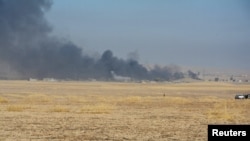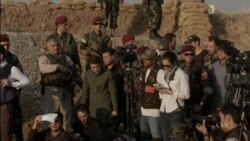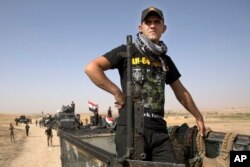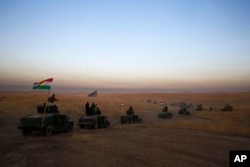One day into the Iraqi-led operation to retake Mosul from the Islamic State terror group, a hopeful Pentagon proclaimed the effort “ahead of schedule,” well aware the outcome could have a significant impact on U.S. strategy in the region.
About 30,000 Iraqi troops and 4,000 Kurdish Peshmerga fighters began advancing on Mosul from the east Monday, quickly clearing villages in surrounding areas while encountering some resistance from IS fighters.
“Early indications are that Iraqi forces have met their objectives so far and that they are ahead of schedule,” Pentagon Press Secretary Peter Cook told reporters. “This is going according to the Iraqi plan.”
That plan includes support from as many as 200 U.S. special operations forces, some positioned just behind the front lines, working in what U.S. defense officials have described as an advise and assist role. Some may even be helping to call in airstrikes.
Most U.S. officials say that despite their confidence and the initial success, they expect the fight to liberate Mosul will be long and possibly bloody, with some warning IS will try to turn Iraq’s second largest city into “hell on earth.”
“This is a significant test," White House Press Secretary Josh Earnest said Monday. “Dislodging them [IS] from the city would be a significant strategic gain.”
It also could validate the Obama administration’s counterterror strategy, which has sought to build up and empower local forces to take on jihadist groups like Islamic State with the help of U.S. air power and a minimal U.S. military footprint on the ground. It is a strategy that has so far seen sporadic success, making progress in places like Yemen, only to see those gains recede.
Still, U.S. officials have been encouraged by the steady momentum of the anti-IS campaign in Iraq, inflicting defeats on the terror group in one city after another, slowly shrinking its self-declared caliphate. And they are confident Iraqi forces will be able to liberate Mosul, just as they did with Ramadi, Fallujah and other cities and towns across Iraq.
“It’s promising in certain aspects,” Institute for the Study of War Iraq analyst Patrick Martin said of the early stages of the campaign to free Mosul.
“They’ve faced some minor resistance and it looks like they’ve been able to stave that off,” he said. “The fact that the Iraqi Security Forces and Peshmerga were able to come to the table and reach a political agreement regarding the composition of forces in the area prior to launching the operation is encouraging.”
But just how long that cooperation can be maintained is an open question, especially because there is no political agreement yet on how to govern Mosul once it is liberated.
“If that isn’t actually taken care of prior to the clearing of the city then we should expect this area to suffer from significant complications going forward,” Martin said.
It is a concern shared by some in the U.S. intelligence community.
“Over the long term, the Iraqi government’s main challenge will be fostering a governance system that is inclusive of Sunnis,” one official told VOA on condition of anonymity. “ISIL’s rapid spread in 2014 was due in part to its appeal to the disenfranchised and marginalized Sunni population.”
Michael Pregent, a former intelligence officer now with the Hudson Institute, is not optimistic.
“You need a lasting buy-in. You need lasting trust with the population centers tying them to Baghdad,” Pregent told VOA from Iraq. “Baghdad’s perfectly comfortable not nurturing that trust.”
And there are questions about whether the Iraqi government has done enough to build trust with those still inside Mosul.
Despite reaching out via radio and television broadcasts, and plans to drop as many as 7 million leaflets over the next 48 hours to communicate with the city’s civilians, aid groups worry fear of Iraqi forces is rampant.
In a statement Monday, the United Nations refugee agency warned that as many as 100,000 Iraqis from Mosul could flee toward Syria and Turkey as the fighting draws near.
And there is concern Islamic State is still well positioned enough to exploit that mistrust, as well as differences among its enemies.
“You have all these groups going into Mosul for different reasons and number three is to defeat ISIS,” Pregent warned. “Numbers one and two is to make sure nobody else gets more than the other group.”
Still, the Pentagon remains convinced that the operation to liberate Mosul can serve as a crucial stepping stone, and allow Iraq’s various factions to set aside their differences
“What we see happening in Mosul and the movement of Iraqi forces today, in some respects, signifies the cooperation those various groups within Iraq are actually engaged in” to defeat IS, the Pentagon’s Peter Cook said.








